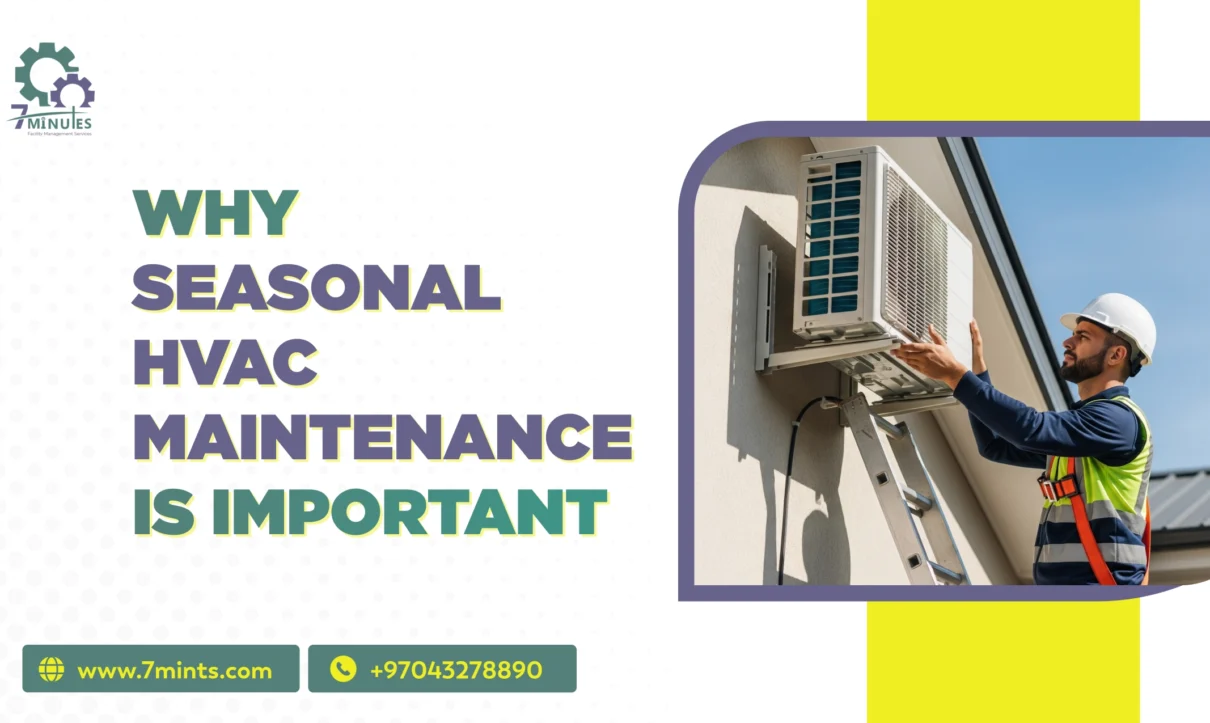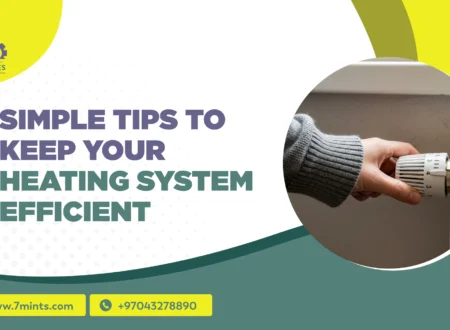Seasonal HVAC Maintenance is a critical practice for keeping heating and cooling systems efficient, reliable, and safe throughout the year. Understanding the HVAC maintenance importance helps homeowners and facility managers prevent sudden breakdowns, reduce energy costs, and improve indoor air quality. A structured HVAC seasonal service guide explains how timely inspections, cleaning, and tuning keep systems running smoothly. Proper HVAC system maintenance also extends equipment lifespan and ensures consistent comfort during extreme weather conditions.
Taking a systematic approach to Seasonal HVAC Maintenance means dividing tasks according to seasonal demands. Before summer, technicians focus on cooling performance, refrigerant levels, and airflow, while winter preparation emphasizes heating safety and efficiency. This method highlights the HVAC maintenance importance of addressing small issues early. A reliable HVAC seasonal service guide outlines step-by-step checklists that simplify planning and reduce costly repairs.
Heating, Ventilation, and Air Conditioning (HVAC) is one of the most important systems in any building, residential or commercial. Comfort is provided through such systems by regulating indoor temperature, ensuring air quality, and controlling humidity. All machines, whether they are part of the HVAC system or not, eventually wear out and deteriorate as time goes by, and maintenance becomes necessary. Seasonal maintenance will prevent any sudden breakdown throughout the year, mainly during the months when the system is most used.
Checking the HVAC system before the summer and winter helps keep breakdowns, exorbitant electricity bills, and low indoor air quality away. Also, it enhances the system’s capability, accumulation of safety, and life span in general. This blog discusses the importance of seasonal maintenance and looks into the maintenance benefits, tasks, and best practices to adhere to.
Seasonal HVAC Maintenance Ensuring Efficiency and Comfort Year-Round
Another key part of Seasonal HVAC Maintenance is routine inspection and cleaning. Filters, coils, and ducts require attention to support effective HVAC system maintenance. Ignoring these basics reduces performance and increases wear, reinforcing the HVAC maintenance importance for both residential and commercial properties. Following a proven HVAC seasonal service guide ensures no component is overlooked during service visits.
Knowing the right Time to Schedule Seasonal Maintenance is just as important as the service itself. Most experts recommend Seasonal HVAC Maintenance twice a year—once in spring and once in fall. This timing reflects the HVAC maintenance importance of preparing systems before peak usage. Choosing the correct Time to Schedule Seasonal Maintenance helps avoid emergency repairs and improves long-term HVAC system maintenance.
- Energy Saving: When well-maintained, an HVAC system uses less energy, mainly because all parts are clean, set up, and running smoothly. When filters are clogged or when the refrigerant level is low, the system must use extra energy to force itself to reach the desired temperature. Seasonal maintenance will make sure that the system uses energy efficiently, detecting and correcting performance issues as they arise. Hence, your energy cost stays low, even with the system running for extended hours during hot or cold seasons.
- Prevents Unexpected Breakdown: Seasonal maintenance allows for HVAC technicians to perform a thorough inspection of the system so that signs of wear or malfunction can be identified early on. This would avoid panicked repair in sudden failures, so remember: summer is a time for fun after school, and it is also when you need the system the most, while during winter it is the same. Faulty part replacement or repair on time is better than having emergency call-outs. Regular checkups will make you feel less worried that your system might let you down at a crucial moment.
- Extends the Life of the HVAC System: Just as vehicles need oil changes and inspections every so often, so do HVAC systems need periodic care to maintain their longevity. Dirt, mechanical issues, wear, and neglect can all cut the lifetime of your equipment. Seasonal maintenance keeps moving parts lubricated, coils clean, and components aligned to allow the system to operate efficiently for many years. With such maintenance, you defer expensive replacements and gain the most dollars from your investment.
- Enhances Indoor Air Quality: Throughout the year, dust, pollen, mold, and other pollutants accumulate in the filters, ducts, and internal parts of an HVAC system. If they aren’t cleaned off occasionally, they will get into your interior living space, creating allergy attacks, headaches, or breathing problems. One of the seasonal maintenance duties should be to look at air filters for contaminants and clean and replace them as necessary. Another is to examine ductwork for contaminants. This never hurts to maintain cleaner and healthier air within the establishment.
- Provides Consistent Comfort Indoors: Through HVAC system maintenance, a comfortable temperature can be maintained indoors throughout the building. Without performing a good maintenance program, in some areas, it will be too hot or cold to bear because of blocked vents, low refrigerant, or uneven airflow. The seasonal check-ups balance the system by checking the correct working status of all of its components. This provides temperature and humidity control at all times, offering a comfortable environment for any season.
- Keeps Your Warranty Valid: In most HVAC systems, the manufacturer places a warranty condition stating a requirement for regular system maintenance. If a breakdown occurs and you haven’t been following the recommended maintenance intervals, your warranty may be voided. That means you cover all costs for repair or replacement. Seasonal maintenance and accompanying service records protect your warranty, thus shielding you from future expenses.
- Helps Identification and Correction of Safety Hazards: If not maintained well, an HVAC system can develop safety hazards such as gas leaks, electrical shorts, or carbon monoxide buildup. These are especially dangerous for heating systems fueled by gas or oil. Seasonal inspections involve checking all the connections for leaks, ensuring all safety controls are working as intended, and so on. Catching these issues early could prevent grave health hazards and costly damage to your property. Check out our latest blog post on How to Plan an HVAC System for a Commercial Building.
- Helps You Keep Repair Expenses Down in the Long Run: When small fixes are put off, they most of the time become bigger issues that are far more expensive to repair. Seasonal maintenance catches these small issues before they grow into something much bigger, which could save you from paying big bucks in repair costs later on. Regular maintenance will also decrease the chances of the system breaking down completely, which is quite inconvenient and expensive to begin with. Preventive maintenance today means emergency repairs tomorrow.
- Assist in Better System Performance: This system runs better with proper adjustment, meaning that it will cool or heat with less effort, thus making the rooms reach temperature quicker with minimal fluctuation. Seasonal maintenance is the upkeep of systems that generally involves cleaning, adjusting, and testing all components to maximize their performance. This enhances airflow, decreases noise, and allows for tighter temperature control within your space.
- Help Reduce the Environmental Impact: An efficient HVAC system consumes less electricity and emits fewer greenhouse gases. Older or poorly maintained systems tend to leak refrigerants or burn more fuel, both of which can contribute to pollution. A seasonal servicing would detect and repair such issues so that they keep the system green. Maintenance of the HVAC system saves energy and helps in protecting the environment.
- Helps in Smoothing Seasonal Changeovers: When shifts occur from cool to heat or the reverse, your HVAC system undergoes a shock if it has not been inspected and tuned up properly. Dirty filters, loose parts, or a low refrigerant charge are all members of an unhappy team that may cause discomfort and inefficiencies. Seasonal maintenance prepares a system for the specific human needs of an approaching season in order to ease transition and thus eliminate performance dips in mode changeover.
- Increases Property Value: A well-maintained HVAC system in itself adds to the overall value of a property. Whether trying to sell or rent the property, potential buyers or tenants would be more inclined to go for a place where heating and cooling were in fine working condition. Regular maintenance reports would also assure them of good care of the HVAC system. Thus seasonal maintenance indirectly boosts your home’s saleability and market value.
Major Tasks Involved in Seasonal HVAC Maintenance
A long-term strategy built around Seasonal HVAC Maintenance improves sustainability and system resilience. Seasonal HVAC Maintenance reduces energy waste, while Seasonal HVAC Maintenance supports healthier indoor environments. This clearly demonstrates the HVAC maintenance importance for modern buildings. A comprehensive HVAC seasonal service guide ties these benefits together into one actionable plan.
Ultimately, Seasonal HVAC Maintenance is not a one-time task but an ongoing responsibility. Seasonal HVAC Maintenance performed systematically leads to fewer disruptions and lower costs. By committing to Seasonal HVAC Maintenance, property owners can protect their investment, enhance comfort, and achieve long-term system efficiency.
- Replace the air filter: Insertion and removal of air filters represent some of the most mundane yet essential chores. Clogged filters obstruct airflow, causing the system to work harder to maintain temperature at an uncomfortable level while reducing the air moisture quality. Not to mention that during seasonal maintenance, our technicians inspect all filters to verify if they need replacing, so air circulation is maintained high. Clean air filters also help reduce energy consumption and boost indoor air freshness.
- Coil Cleaning (Evaporator & Condenser Coils): Over time, coils accumulate dirt and debris, preventing heat absorption and cooling capacity. Consequently, dirty coils force your system to run longer, consuming more energy and putting strain on the equipment. Cleaning the evaporator and condenser coils while performing maintenance restores efficiency and prevents the coils from overheating or freezing. This enables the system to run smoothly while preventing costly damages.
- Thermostat Testing and Calibration: An inaccurate thermostat may in fact cause heating or cooling when neither is needed, resulting in wasted energy and discomfort. During seasonal servicing, technicians test the thermostat and recalibrate it to give an accurate reading of the temperature, therefore allowing better control of indoor comfort. Some homeowners take this opportunity to upgrade to smart thermostats.
- Refrigerant Level Check: The refrigerant is the lifeblood of any system. Low refrigerant levels could mean your air conditioner will not cool efficiently and the compressor could get damaged. Hence, seasonal maintenance entails checking refrigerant levels and refilling them if necessary. The technician will also check for leaks that could damage the system and harm the environment. When the correct amount of refrigerant is present, your system offers powerful and steady cooling.
- Electrical Component Inspection: Weak wiring, loose connections, and compromised components could be fire hazards or cause system failures. The technician inspects your HVAC electrical parts, including capacitors, relays, and contactors, to avert any dangers and ensure they are working to specification. The worn parts will be fixed or replaced during the inspection. This, therefore, ensures that your system runs safely and efficiently.
- Ductwork and Vent Check: A blocked air duct or one leaking air ensures that the system is inefficient and gives an uneven sense of heat or cool to rooms. During seasonal checkups, ductwork is inspected for signs of dirt accumulation, mold, or any signs of damage. Vents are cleaned and tested for good airflow. Good airflow through the ducts and vents ensures that your level of comfort and the performance of the system are enhanced.
Time to Schedule Seasonal Maintenance
For property owners, understanding the Time to Schedule Seasonal Maintenance supports better budgeting and system reliability. Regular Seasonal HVAC Maintenance also aligns with manufacturer requirements and warranty terms. This reinforces the HVAC maintenance importance of professional inspections backed by a clear HVAC seasonal service guide. Such planning makes HVAC system maintenance more predictable and cost-effective.
In commercial settings, Seasonal HVAC Maintenance plays a major role in operational efficiency and occupant comfort. Facility managers rely on the HVAC maintenance importance to maintain compliance, safety, and energy performance. Establishing a fixed Time to Schedule Seasonal Maintenance ensures uninterrupted operations and fewer system failures.
Conclusion
Seasonal maintenance means more than just periodic servicing because it protects your system, costs, and comfort. From reducing energy bills to improving air quality and preventing a big repair, seasonal maintenance brings benefits that are long-standing and far-reaching. When you opt for good, periodic maintenance, you ensure the efficiency, reliability, and safety of your HVAC system all year round. Don’t wait for a breakdown Contact us and go ahead and schedule your seasonal maintenance for HVAC now, and enjoy an indoor environment healthier, more comfortable, and more economical, no matter what the weather has in store.










1 Comment
Comments are closed.